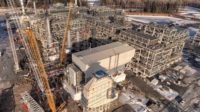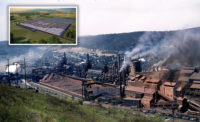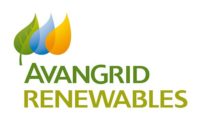AECOM will exit work in Russia “immediately” in response to Russia's invasion of Ukraine, the company announced on March 7, an action it said would generate up to a $50-million one-time expense in its second quarter, based on impaired assets.
The firm, which reported $13.3 billion in global revenue, said the financial contribution from its Russia operations is not “material,” but a spokesman declined to disclose details on pending projects. operations or clients there that would be affected.
AECOM has offices in Moscow and St. Petersburg.
“We support the people of Ukraine who are facing tremendous suffering as a result of Russia’s unlawful invasion,” said AECOM's CEO Troy Rudd, adding that the country's actions “are inconsistent with [the firm's] values and have compromised” its business environment and clients.
“The impact of these actions is particularly unfortunate for our colleagues from our Russia business, and we have taken steps to provide them support during this transition,” Rudd added. “Our priority continues to be ensuring the safety, security and well-being of our teams throughout the region.”
AECOM reported a staff of about 400 mostly local employees in Russia. In a statement to Building, a U.K.-based construction publication, two days before the invasion, it said operations were “unaffected” by troop movements into eastern Ukraine.
The firm had been project manager for construction of the 87-story Lakhta Centre in St. Petersburg. Completed in 2018, the 1,515-ft tower is Europe’s tallest. The estimated $1.8-billion skyscraper is the corporate headquarters of Russia's state-owned energy firm Gazprom.
A 2,306-ft-high, 150-story adjacent structure called Lakhta Centre II was proposed by Gazprom last year, with Scotland-based architect Kettle Collective serving as its designer but no project cost announced. If built, it would be the world's second tallest tower. The architect's founder Tony Kettle also designed Lakhta Centre I, along with a Russian firm.
AECOM told U.K. construction sector publication Building in 2018 that it had about $50 million in annual revenue from work in Russia and had been working in the country since the late 1990s.
Other Firms Exit Russia
Finland-based contractor YIT, said to be the country's largest construction company, also said it has stopped investment in Russia over its actions in Ukraine. The firm, which builds mostly multi-unit housing structures, said March 3 that new project work would stop while it conducts an accelerated strategic review of its operations. YIT also halted purchases of construction materials, mostly lumber, from Russia.
“The Russian military attack has led to great human distress and suffering in Ukraine,” said Markku Moilanen, YIT president and CEO. “Due to the dramatic changes in geopolitical situation, our business is facing unprecedented challenges in Russia, and our highest priority now is to ensure the health and safety of our employees."
The firm said the Ukraine action has impacted worker availability in Finland and in central Eastern European and Baltic countries.
A number of architects, including U.K.-based giant Foster & Partners, also have announced exits from Russian projects since the invasion, says Architectural Record, ENR's sister publication.
Ties to Oligarch
Meanwhile, U.K. publication Building reported that Russian oligarch Oleg Deripaska, who has ties to Russia President Vladimir Putin, has an ownership stake in Austrian contractor Strabag, which is part of a joint venture that has a major tunneling contract on Britain's HS2 high-speed rail megaproject.
A Strabag statement confirmed it is 28% owned by Rasperia Trading Ltd, a business that Deripaska owns, but claimed that Deripaska “holds less than 50% of its shares” and added that Strabag's management “manages the company on its own responsibility, i.e. without instructions from the supervisory board and shareholders.”
The UK government on March 10 formally sanctioned Deripaska and froze his UK assets, and on March 14 Strabag cancelled dividend payments to his firm, also saying it will end work in Russia, which made up just 0.3% of its revenue.
Strabag ranks at No. 16 on ENR's Top 250 Global Contractors list, with nearly $19 billion in 2020 revenue, of which $15.9 billion is international.
A Strabag spokesperson told Building that "no sanctions" have been imposed on the firm "or on any of its direct/indirect shareholders by the E.U., U.S. or the U.K. in connection with the Ukraine war in 2022, and we are not expecting any impact on our U.K. operations.” The contractor remains on the HS2 project.
Deripaska's name also is on a list of Russian oligarchs, bankers and government officials against whom Canada announced sanctions on March 7, said Politico, and he was among oligarchs sanctioned by the US in 2018.
Strabag CEO Thomas Birtel told a European business executive gathering on March 3 that the company has “no enterprise actions in Ukraine and solely restricted enterprise actions in Russia." He said sanctions imposed on Russian banks have “no influence on the enterprise and monetary scenario” of the contractor.
“This war of aggression is not only in stark contradiction to everything we believe in under international law and morally, it also hurts us personally that the peace project in Europe is being set back by decades,” Strabag's statement said, noting efforts by its units in Poland and the Czech Republic in launching aid initiatives.
In a social media post, Deripaska has called for an end to the invasion, saying “it is insane to prolong negotiations” for peace, according to a Radio Free Europe report.






Post a comment to this article
Report Abusive Comment